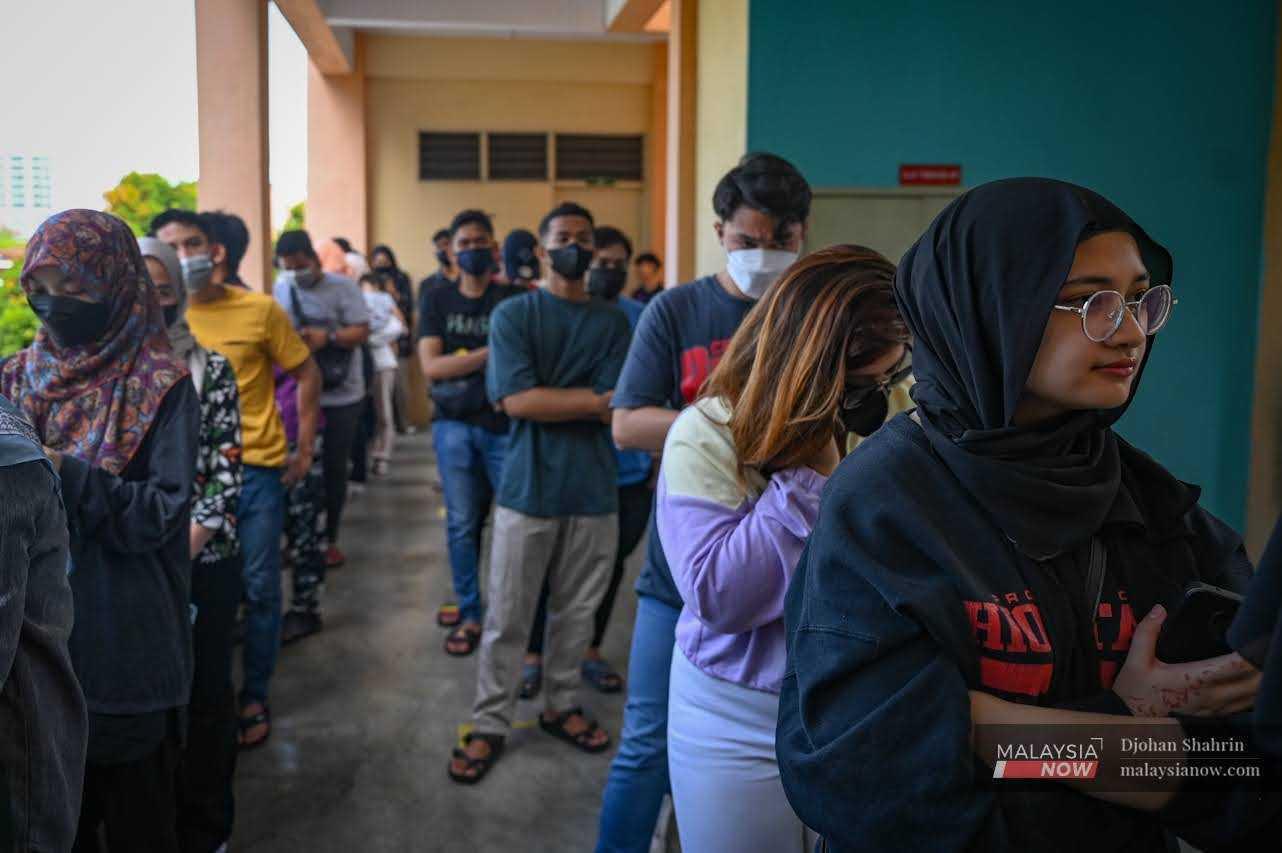Making sense of the 'conservative', 'progressive' labels post-GE15
The recent debate over the direction of the Undi 18 vote has much to do with terminology, says a political scientist.
Just In
One of millions of first-time voters, Aliff could not hide his excitement during the recent general election.
In the heat of the excitement, he uploaded a short video on TikTok, showing himself among a crowd who attended an event featuring a PAS leader in his constituency.
A day after polling, his video had more than 100,000 views, but many had left comments labelling him a "conservative" and "extremist", and using phrases such as "this is why Malaysia is not progressing".
The views ballooned to over 400,000, with more comments that turned into a heated political debate as the country grappled with the results of the election which saw a hung parliament amid historic gains by Islamist party PAS.
Aliff deleted his video, afraid of how the debate was taking shape around the simple clip he had posted.
"Until now I don't understand, what's wrong if I vote and support PAS? Why ask us to participate if those of us who just finished school were told that our votes are not important?" the culinary student from Tangkak, Johor, told MalaysiaNow.
Aliff's experience was just a glimpse of the online mudslinging that occurred in the wake of the election outcome.
Many comments attacked first-time voters, especially those between 18 and 23, with names such as "TikTok soldiers", as it became apparent that a large chunk of young voters had backed Perikatan Nasional (PN), with candidates from the coalition's component PAS winning nearly 50 parliamentary seats in GE15, its biggest victory in history.
There were also claims that the Undi 18 voters were too conservative for siding with PAS, which had already been accused of extremism.
Once celebrated as a youthful voice that would strengthen Malaysia's democracy, the Undi 18 voters were suddenly a threat to democracy, because some felt that their choice was against "progressive ideas" as defined by other political coalitions.
For prominent political scientist Chandra Muzaffar, the problem lies with terminology.
Chandra, who has studied Malaysia's democratic history for half a century, said the use of terms such as "progressive" and "conservative" only deepens the problem, as many invoke them without understanding what they represent.
One problem, said Chandra, is the assumption that conservatism is the opposite of progress. He added that such an understanding stems from a failure to fall back on history and social environment.
"Remember that these terms emerged from the Western political system. And of course, they are influenced by the environment of Western society. For this reason, we must be careful," he told MalaysiaNow.
He said when such terms are used in Malaysia, they must be in the context of the country's demography.
"For example, one who defends religion as a societal practice is considered conservative, and one who is secular is considered progressive.
"But if a society adheres to religion, and values and celebrates it, it is because it is their way and practice. We should not dismiss it as merely conservative," he said.
Chandra said for many people, religion is a big part of their way of life, adding however that this did not mean those who ignore religion are progressive.
He said it is not easy to use the two terms without understanding a society's background, as they convey different meanings.
Citing the example of India, Chandra said the Muslims there prefer secularism because religion and politics in the country are often associated with Hindu extremism.
"That's why they choose secularism. But it doesn't mean they abandon the religion. They still subcribe to Islamic values and laws, but they are more inclined to be secular in the context of their country."
In contast, Chandra said there are few who hold strongly to religion, adding that they could be people who are very open-minded about matters such as justice and free speech.
"Why? Because they view these as also existant in religion. It is not something conservative or progressive, it is a religious practice for them.
"As Muslims, they know for instance that in Islamic philosophy, there are elements that strongly support social justice. These include zakat to the distribution of wealth, which leads to social justice.
"Another example is the concept of waqf, which is about social justice in Islam," he said, adding that those who are strong in their religious practices would stick to those ideas without taking them from other concepts.
"These already exist in Islam."
Islam and family values
Chandra also disagreed with the assumption promoted in recent times that a person is conservative just because he or she does not agree with the idea of homosexuality or same-sex marriage.
He said in a religious environment that ranks highly the family institution, same-sex marriage is abhorred because a family is defined as born from the relationship between a man and a woman.
"We must understand the context and history that are meant here, as well as the religious characteristics in a particular society. For Muslims, there are progressive elements found in the religion itself, and as such it is not necessary to refer to other sources.
"He refers to Islam, to the life of the Prophet, to the history of Islam, and he can embrace elements such as social justice and harmony, and so on.
Chandra said the recent debate on the younger generation who have been given the right to vote should be studied within the contexts discussed above.
He said there was nothing wrong with such a debate, as long as it is discussed and argued using local experiences and contexts instead of nurtured through traditions that are alien to Malaysian society.
Subscribe to our newsletter
To be updated with all the latest news and analyses daily.
Related Articles
Most Read
No articles found.
